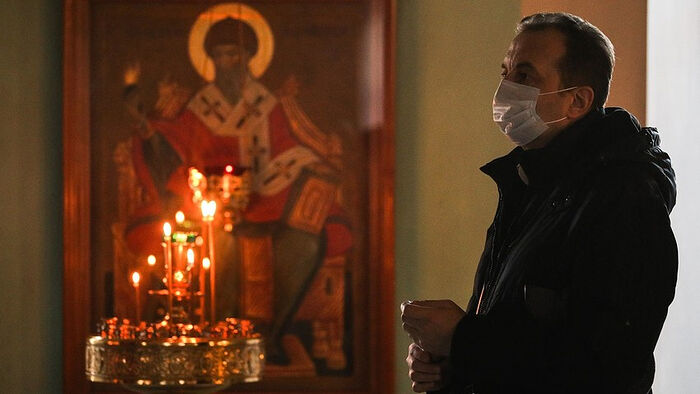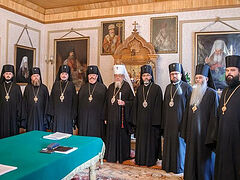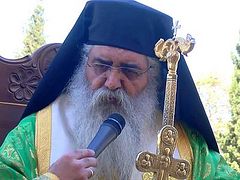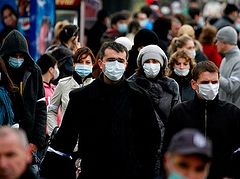U.S.A., July 23, 2021
A new report from Alexei Krindatch, the National Coordinator of the Census of Orthodox Christian Churches, details the initial results of an ongoing study on how the COVID pandemic has impacted Orthodox Christian parishes in America.
The study, “Exploring the Pandemic Impact on Parishes: Innovation Amidst and Beyond COVID-19,” is being conducted in partnership with many other denominations, coordinated by the Hartford Institute for Religious Research and the Faith Communities Today research initiative.
The survey was conducted July 1-14, with the participation of 151 clergy, offering a balanced representation of all jurisdictions and geographic distribution of parishes (only the Antiochian Archdiocese is underrepresented, the report notes). The report presents findings for all parishes combined, and separately for the three most represented jurisdictions: the Greek Orthodox Archdiocese, the Orthodox Church in America, and the Russian Orthodox Church Outside of Russia.
It is noted that ROCOR is also profiled separately because of “the different approach they took to dealing with the pandemic.”
The survey sent to the clergy consisted of several questions under 10 main headings:
1. How complete was the lockdown of parish life during the pandemic?
44% of all parishes responded that they never stopped in-person services at their church, while 93% of ROCOR parishes responded that they never stopped. ROCOR also had the highest rate of parishes responding that their ministries continued without major disruption.
Many parishes spoke of various technological innovations to deal with the new challenges, while some parishes professed that they simply continued as always. One parish in Texas responded: “We didn’t change anything—literally nothing—and no one ever got sick. We stayed open, served the community, celebrated the Holy Mysteries, and took care of other parishes whose clergy or hierarchs ignored them.”
2. How strongly did the pandemic impact parishioners’ personal wellbeing?
84% of parishes reported having COVID-infected parishioners, while 29% had one or more parishioners who died.
Interestingly, “Survey data also indicated that those parishes that continued in-person services throughout the pandemic were less affected by the COVID infection and COVID-related deaths among members (75% and 14%) than were the parishes which had stopped in-person worship (90% and 43%).”
The pandemic had relatively little financial impact on parishioners, “but it affected more strongly their needs for counseling and spiritual guidance.”
3. How strongly did the pandemic impact the emotional and spiritual wellbeing of Orthodox clergy?
The clergy of the Orthodox Church in America seem to have been more seriously affected, with 45% of clergy having considered leaving pastoral ministry at least once (compared to 32% for all parishes and just 9% for ROCOR), and 33% doubting that they are called to God’s ministry (compared to 21% for all parishes and 0% for ROCOR).
4. How much did the pandemic impact the financial health of parishes?
Interestingly, only 7% of parishes agreed and 16% somewhat agreed that the financial viability of the parish has been put at risk by the pandemic. On the other hand, 48% have experienced an increase in donations since the pandemic began. This was much higher in ROCOR (79%) and the GOA (61%) than in the OCA (23%).
5. Did the pandemic change the level of member involvement?
“In short, the number of parishioners participating regularly in the lives of their parishes decreased,” the report states, though it is more nuanced when taking into account virtual attendance.
However, more than two-thirds (69%) of ROCOR parishes reported an increase in participation, with only 8% reporting a decrease, compared to a 5% increase and 70% decrease in the GOA. Overall, 59% reported a decrease and only 20% an increase.
6. Which areas of parish life were affected most negatively and strongly?
Taking all jurisdictions combined, the most affected ministries were children’s religious education and fellowship events.
7. How widespread were conflicts over various pandemic restrictions?
Overall, 35% of parishes experienced either moderate or harsh disagreements, while only 15% avoided disagreements altogether. ROCOR experienced the least disagreements, while the OCA experienced the most, with nearly half (48%) reporting either moderate of severe internal disagreements.
8. Did parishes try to educate their members about the pandemic and/or encourage them to get vaccinated?
Overall, 31% of clergy encouraged vaccination, while only 15% of ROCOR respondents encouraged it.
9. How significant is online attendance as compared to in-person attendance?
32% of regular attendees for all parishes now do so remotely. For the OCA and GOA, the number is slightly higher, at 36%, while it is considerably lower for ROCOR, at 10%.
10. How do parishes envision their future in light of experiences in the pandemic?
“Overall, the strong majority of parishes are very optimistic about their post-pandemic life and, most importantly, have even found ways to rejuvenate themselves while dealing with the challenges of COVID-19,” the report states.
The report ends discussing ideas that worked during the pandemic, noting that several parishes increased the number of weekly Liturgies in response to restrictions on the number of attendees, and many parishes found that Bible studies and catechesis over Zoom allowed more people to attend.
Follow us on Facebook, Twitter, Vkontakte, Telegram, WhatsApp, MeWe, and Gab!





